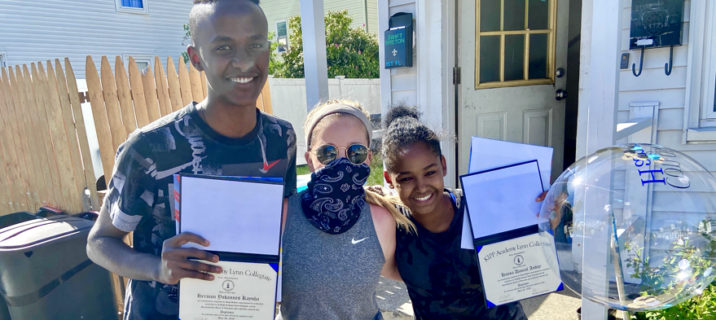We Didn’t Walk at Graduation, But That’s the Least of the Challenges We’ve Overcome
ByHermon Kaysha
Hermon Kaysha holding diploma
On May 28th, my fellow classmates and I graduated from KIPP Academy Lynn Collegiate, part of a K-12 charter public school network in Lynn, Massachusetts. It was a hard moment for us. We couldn’t embrace each other and express affection the way we used to. Leading up to graduation, we didn’t have the chance to wear our lovely prom outfits. My first date was supposed to be on prom night, but it didn’t happen. That means I’m the guy who graduated without ever going on a date in my whole four years of high school! If other graduates are reading this piece, I hope this makes you feel a little better about your situation.
THIS IS NOT THE FIRST TIME THAT WE’VE FACED DIFFICULTIES; IN FACT, MOST OF US HAVE HAD TO OVERCOME SO MANY OBSTACLES TO BE WHERE WE ARE TODAY.
My classmates and I, like so many other seniors across this country, didn’t have the opportunity to cross the stage and collect our diplomas together. I’m not going to lie, I was so frustrated at first. I really felt that we were part of the most unfortunate class ever—until I realized something. This is not the first time that we’ve faced difficulties; in fact, most of us have had to overcome so many obstacles to be where we are today.

Some of us have to work to support our families. Others have had to take care of our siblings after school, or didn’t have a home at some point in our lives. Many of us, as minorities in this country, have had to—and continue to—endure racism and stereotyping.
AMERICA WASN’T WHAT I EXPECTED
The realization that our current situation, while less-than-ideal, was nothing compared to what we had endured to make it to high school graduation, really hit home for me. My parents emigrated from Ethiopia and left me with my grandparents when I was one year old. I remember always asking my grandparents, “Why did my parents leave me?” They always replied, “to have better opportunities and a better life.”
When I finally arrived in the United States to join them, I was curious to see if the reasons why my parents had left Ethiopia to come to this country had come true. When I arrived, nothing was what I expected. Although my mother was seven months pregnant, she was still working long hours in order to pay rent. I wondered, “where are the opportunities she came for?” I realized that one of the main reasons my mother was struggling was because she did not speak English. It was at that moment that I internalized the fact that the English language was key not only for my survival, but also to provide economic security for my family.
Read the full article here
